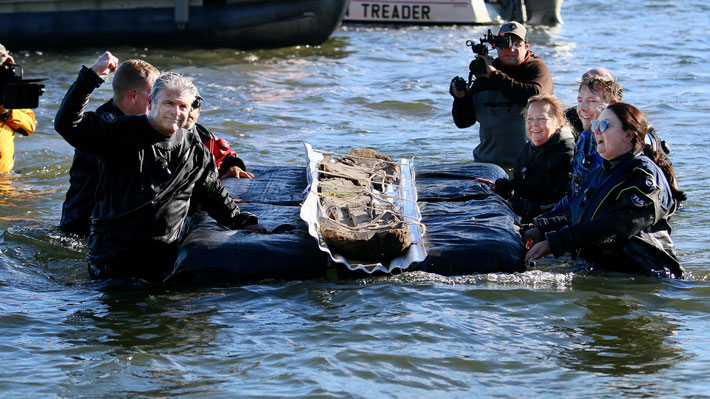 MADISON, WISCONSIN—The Milwaukee Journal Sentinel reports that a total of 10 dugout canoes have recently been found in southern Wisconsin’s Lake Mendota. The first two canoes were discovered in 2021 and 2022 by maritime archaeologist Tamara Thomsen of the Wisconsin Historical Society while she was scuba diving, leading to additional searches of the area, which is thought to have been the lake’s ancient shoreline. Researchers think the canoes were submerged to preserve them through the winter months. “It was becoming clear that we weren’t just looking at one canoe that had sunk, or two canoes—that we had an assemblage, and they might not all be the same,” said state archaeologist Amy Rosebrough. The oldest vessel, made of elm, is approximately 4,500 years old, showing that hunter-gatherers traveled by dugout canoe in the Late Archaic period. Two other canoes have also been dated to this period. Two of the vessels, dated to the Middle Woodland period that began some 2,000 years ago, were made of oak and would have been paddled by early farmers who made pottery, expanded their trading networks, and began constructing burial mounds. Fragments representing three or maybe four canoes have been dated to the Late Woodland period, more than 1,000 years ago, when the practice of corn farming and the building of effigy mounds had become widespread in the region. The most recent vessel, made of red oak, has been dated to A.D. 1250, when permanent farming towns had been established. Surveys are also being conducted to look for any traces of a now submerged village inhabited by the ancestors of today’s Ho-Chunk Nation. For more on the first canoe's discovery, go to "Gone Fishing."
MADISON, WISCONSIN—The Milwaukee Journal Sentinel reports that a total of 10 dugout canoes have recently been found in southern Wisconsin’s Lake Mendota. The first two canoes were discovered in 2021 and 2022 by maritime archaeologist Tamara Thomsen of the Wisconsin Historical Society while she was scuba diving, leading to additional searches of the area, which is thought to have been the lake’s ancient shoreline. Researchers think the canoes were submerged to preserve them through the winter months. “It was becoming clear that we weren’t just looking at one canoe that had sunk, or two canoes—that we had an assemblage, and they might not all be the same,” said state archaeologist Amy Rosebrough. The oldest vessel, made of elm, is approximately 4,500 years old, showing that hunter-gatherers traveled by dugout canoe in the Late Archaic period. Two other canoes have also been dated to this period. Two of the vessels, dated to the Middle Woodland period that began some 2,000 years ago, were made of oak and would have been paddled by early farmers who made pottery, expanded their trading networks, and began constructing burial mounds. Fragments representing three or maybe four canoes have been dated to the Late Woodland period, more than 1,000 years ago, when the practice of corn farming and the building of effigy mounds had become widespread in the region. The most recent vessel, made of red oak, has been dated to A.D. 1250, when permanent farming towns had been established. Surveys are also being conducted to look for any traces of a now submerged village inhabited by the ancestors of today’s Ho-Chunk Nation. For more on the first canoe's discovery, go to "Gone Fishing."
Wisconsin’s Lake Mendota Yields Ancient Dugout Canoes
